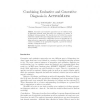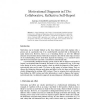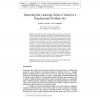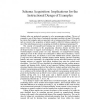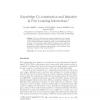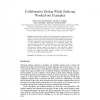AIED
2009
Springer
14 years 6 months ago
2009
Springer
Generative and evaluative approaches are two different ways of diagnosing students’ input that have been realized in a number of intelligent tutoring systems. We describe how Ac...
AIED
2009
Springer
14 years 6 months ago
2009
Springer
A central challenge in the design of motivationally intelligent tutoring systems lies in defining and diagnosing a learner’s motivational state: in particular, in distinguishing ...
AIED
2009
Springer
14 years 6 months ago
2009
Springer
Traditional methods of dental surgical skills training and assessment are being challenged by complications such as unavailability of expert supervision and the subjective manner o...
AIED
2009
Springer
14 years 6 months ago
2009
Springer
This paper focuses on whether learners of basic music theory may find a multiple-media independent open learner model useful to explore their knowledge of harmony concepts. Learner...
AIED
2009
Springer
14 years 6 months ago
2009
Springer
Researchers that make tutoring systems would like to know which pieces of educational content are most effective at promoting learning among their students. Randomized controlled e...
AIED
2009
Springer
14 years 6 months ago
2009
Springer
AIED
2009
Springer
14 years 6 months ago
2009
Springer
The aim of the project we discuss in this paper is to develop a computational model of peer learning. We present an extensive analysis of peer learning dialogues, analysis on which...
AIED
2009
Springer
14 years 6 months ago
2009
Springer
We describe an automated method to assess the expressiveness of children’s oral reading by measuring how well its prosodic contours correlate in pitch, intensity, pauses, and wor...
AIED
2009
Springer
14 years 6 months ago
2009
Springer
We propose a design model for guiding learning in exploratory environments through representational choices. Selecting the appropriate representations at the correct granularity ca...
AIED
2009
Springer
14 years 6 months ago
2009
Springer
Self-explaining is a beneficial learning strategy for studying worked-out examples because it either supplies missing information through the generation of inferences or because it...
